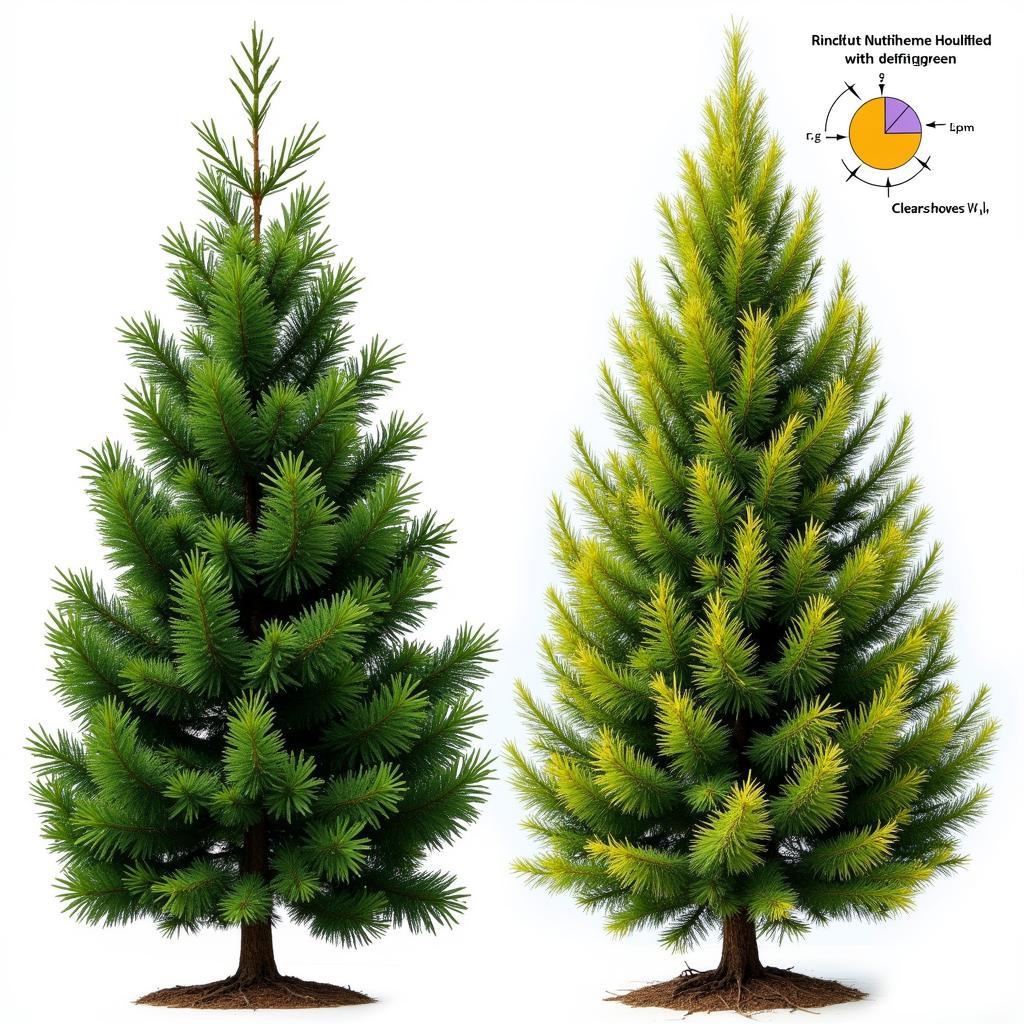Evergreens, with their vibrant green foliage throughout the year, bring life and beauty to any landscape. Maintaining their lush appearance requires proper care, including providing the Best Plant Food For Evergreens. Choosing the right fertilizer is crucial for sustained health and vibrancy.
Understanding Evergreen Nutritional Needs
Evergreens, unlike deciduous plants, don’t lose their leaves and therefore require a consistent supply of nutrients. These nutrients are essential for various processes, including photosynthesis, new growth, and disease resistance. A balanced fertilizer with the right mix of nitrogen, phosphorus, and potassium is key. Nitrogen promotes lush foliage, phosphorus strengthens roots, and potassium contributes to overall plant health. Understanding the specific needs of your evergreens based on their variety and soil conditions is vital.
Choosing the Right Fertilizer Type
Selecting the best plant food for evergreens involves considering various factors. Granular, liquid, and slow-release fertilizers are common options, each with its advantages and disadvantages. Granular fertilizers are easy to apply and provide a slow, steady release of nutrients. Liquid fertilizers offer quick absorption but require more frequent applications. Slow-release fertilizers provide a consistent supply of nutrients over an extended period, reducing the frequency of application.
The soil pH also plays a crucial role in nutrient absorption. Evergreens generally prefer slightly acidic soil, typically between 5.5 and 6.5. A soil test can help determine your soil’s pH and guide your fertilizer choices.
When and How to Fertilize Your Evergreens
Timing is crucial when fertilizing evergreens. The best time to fertilize is typically in early spring, just before new growth begins. This allows the plants to utilize the nutrients effectively during their active growing period. Avoid fertilizing late in the season, as this can encourage new growth that may be vulnerable to winter damage.
Applying fertilizer correctly is equally important. Follow the instructions on the fertilizer packaging carefully, as over-fertilizing can harm your evergreens. Water the area thoroughly after applying fertilizer to help distribute the nutrients evenly.
Signs of Nutrient Deficiency
Recognizing signs of nutrient deficiency in evergreens can help you address the issue promptly. Yellowing needles, stunted growth, and sparse foliage can indicate a lack of essential nutrients. A soil test can confirm the deficiency and guide your fertilizer selection.
 Signs of Nutrient Deficiency in Evergreens: Yellowing Needles and Stunted Growth
Signs of Nutrient Deficiency in Evergreens: Yellowing Needles and Stunted Growth
Natural Fertilizers for Evergreens
For those seeking more natural options, compost and other organic materials can provide excellent nutrition for evergreens. Compost enriches the soil, improves drainage, and provides a slow-release of nutrients. Other natural options include manure tea, worm castings, and fish emulsion.
Benefits of Organic Fertilizers
Organic fertilizers offer several benefits. They improve soil health, reduce the risk of chemical runoff, and support beneficial soil organisms. They also contribute to a more sustainable gardening practice.
“Using organic fertilizers is like investing in long-term soil health. It’s a gentler, more sustainable approach that benefits both your plants and the environment,” says Dr. Emily Carter, a horticulturalist with over 20 years of experience.
Maintaining Healthy Evergreens: Beyond Fertilization
While fertilizing is essential, other factors contribute to healthy evergreens. Proper watering, adequate sunlight, and appropriate pruning are all crucial for maintaining their vibrant appearance. “Think of it like a holistic approach – providing your evergreens with all the elements they need to thrive, not just food,” adds Dr. Carter. Regularly inspecting your evergreens for pests and diseases can also help prevent potential problems.
Providing the best plant food for evergreens is a key aspect of maintaining their health and beauty. By understanding their nutritional needs, choosing the right fertilizer, and applying it correctly, you can ensure your evergreens thrive all year round.
FAQ
- How often should I fertilize my evergreens?
- What are the signs of over-fertilizing?
- Can I use the same fertilizer for all types of evergreens?
- What is the best time of year to apply fertilizer?
- Are there any natural alternatives to chemical fertilizers?
- How can I test my soil’s pH?
- Can I fertilize newly planted evergreens?
Need More Help?
For further assistance with your evergreen care, explore our other articles on evergreen pruning and pest control.
When you need expert advice, reach out to us! Call us at 02437655121, email us at minacones@gmail.com, or visit us at 3PGH+8R9, ĐT70A, thôn Trung, Bắc Từ Liêm, Hà Nội, Việt Nam. We have a 24/7 customer service team ready to assist you.